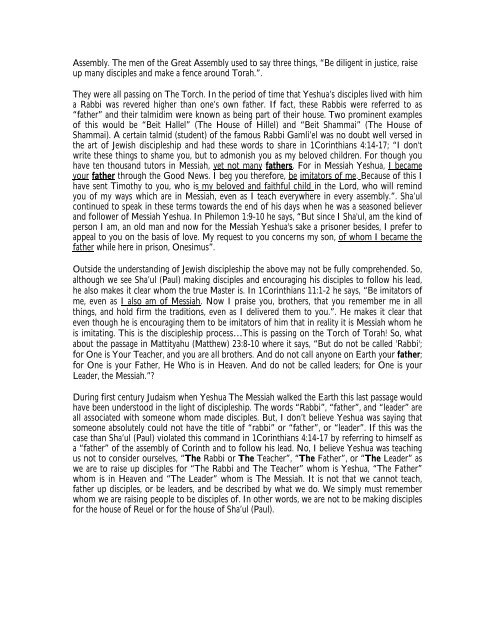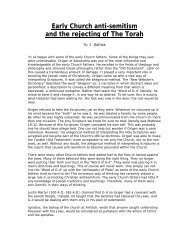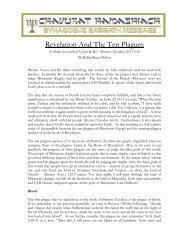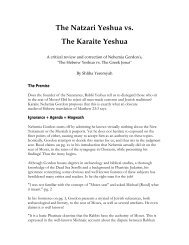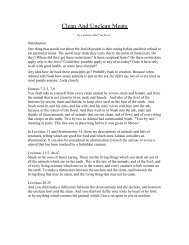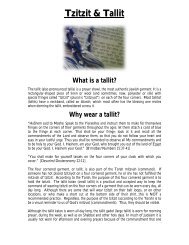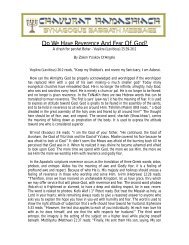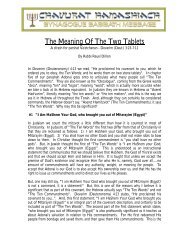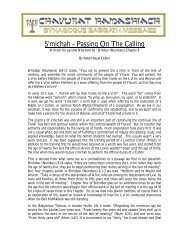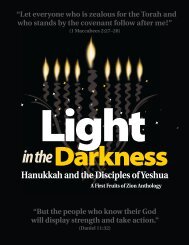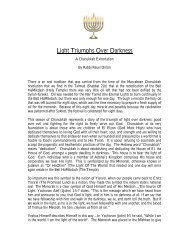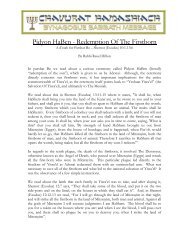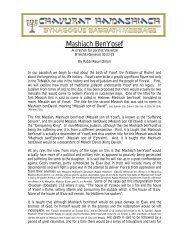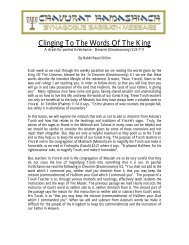Passing On The Torch Of Torah - Synagogue Chavurat HaMashiach
Passing On The Torch Of Torah - Synagogue Chavurat HaMashiach
Passing On The Torch Of Torah - Synagogue Chavurat HaMashiach
- No tags were found...
Create successful ePaper yourself
Turn your PDF publications into a flip-book with our unique Google optimized e-Paper software.
Assembly. <strong>The</strong> men of the Great Assembly used to say three things, “Be diligent in justice, raiseup many disciples and make a fence around <strong>Torah</strong>.”.<strong>The</strong>y were all passing on <strong>The</strong> <strong>Torch</strong>. In the period of time that Yeshua’s disciples lived with hima Rabbi was revered higher than one’s own father. If fact, these Rabbis were referred to as“father” and their talmidim were known as being part of their house. Two prominent examplesof this would be “Beit Hallel” (<strong>The</strong> House of Hillel) and “Beit Shammai” (<strong>The</strong> House ofShammai). A certain talmid (student) of the famous Rabbi Gamli’el was no doubt well versed inthe art of Jewish discipleship and had these words to share in 1Corinthians 4:14-17; “I don'twrite these things to shame you, but to admonish you as my beloved children. For though youhave ten thousand tutors in Messiah, yet not many fathers. For in Messiah Yeshua, I becameyour father through the Good News. I beg you therefore, be imitators of me. Because of this Ihave sent Timothy to you, who is my beloved and faithful child in the Lord, who will remindyou of my ways which are in Messiah, even as I teach everywhere in every assembly.”. Sha’ulcontinued to speak in these terms towards the end of his days when he was a seasoned believerand follower of Messiah Yeshua. In Philemon 1:9-10 he says, “But since I Sha'ul, am the kind ofperson I am, an old man and now for the Messiah Yeshua's sake a prisoner besides, I prefer toappeal to you on the basis of love. My request to you concerns my son, of whom I became thefather while here in prison, <strong>On</strong>esimus”.Outside the understanding of Jewish discipleship the above may not be fully comprehended. So,although we see Sha’ul (Paul) making disciples and encouraging his disciples to follow his lead,he also makes it clear whom the true Master is. In 1Corinthians 11:1-2 he says, “Be imitators ofme, even as I also am of Messiah. Now I praise you, brothers, that you remember me in allthings, and hold firm the traditions, even as I delivered them to you.”. He makes it clear thateven though he is encouraging them to be imitators of him that in reality it is Messiah whom heis imitating. This is the discipleship process…This is passing on the <strong>Torch</strong> of <strong>Torah</strong>! So, whatabout the passage in Mattityahu (Matthew) 23:8-10 where it says, “But do not be called 'Rabbi';for <strong>On</strong>e is Your Teacher, and you are all brothers. And do not call anyone on Earth your father;for <strong>On</strong>e is your Father, He Who is in Heaven. And do not be called leaders; for <strong>On</strong>e is yourLeader, the Messiah.”?During first century Judaism when Yeshua <strong>The</strong> Messiah walked the Earth this last passage wouldhave been understood in the light of discipleship. <strong>The</strong> words “Rabbi”, “father”, and “leader” areall associated with someone whom made disciples. But, I don’t believe Yeshua was saying thatsomeone absolutely could not have the title of “rabbi” or “father”, or “leader”. If this was thecase than Sha’ul (Paul) violated this command in 1Corinthians 4:14-17 by referring to himself asa “father” of the assembly of Corinth and to follow his lead. No, I believe Yeshua was teachingus not to consider ourselves, “<strong>The</strong> Rabbi or <strong>The</strong> Teacher”, “<strong>The</strong> Father”, or “<strong>The</strong> Leader” aswe are to raise up disciples for “<strong>The</strong> Rabbi and <strong>The</strong> Teacher” whom is Yeshua, “<strong>The</strong> Father”whom is in Heaven and “<strong>The</strong> Leader” whom is <strong>The</strong> Messiah. It is not that we cannot teach,father up disciples, or be leaders, and be described by what we do. We simply must rememberwhom we are raising people to be disciples of. In other words, we are not to be making disciplesfor the house of Reuel or for the house of Sha’ul (Paul).


